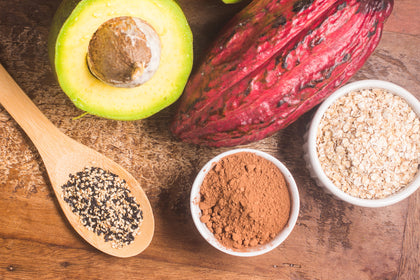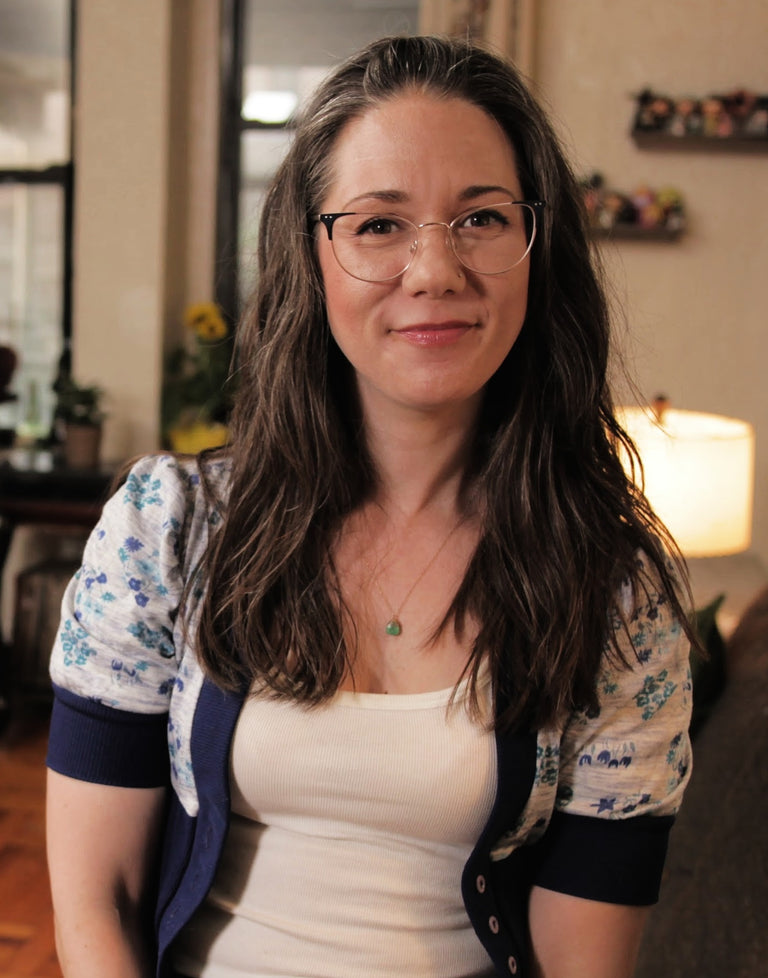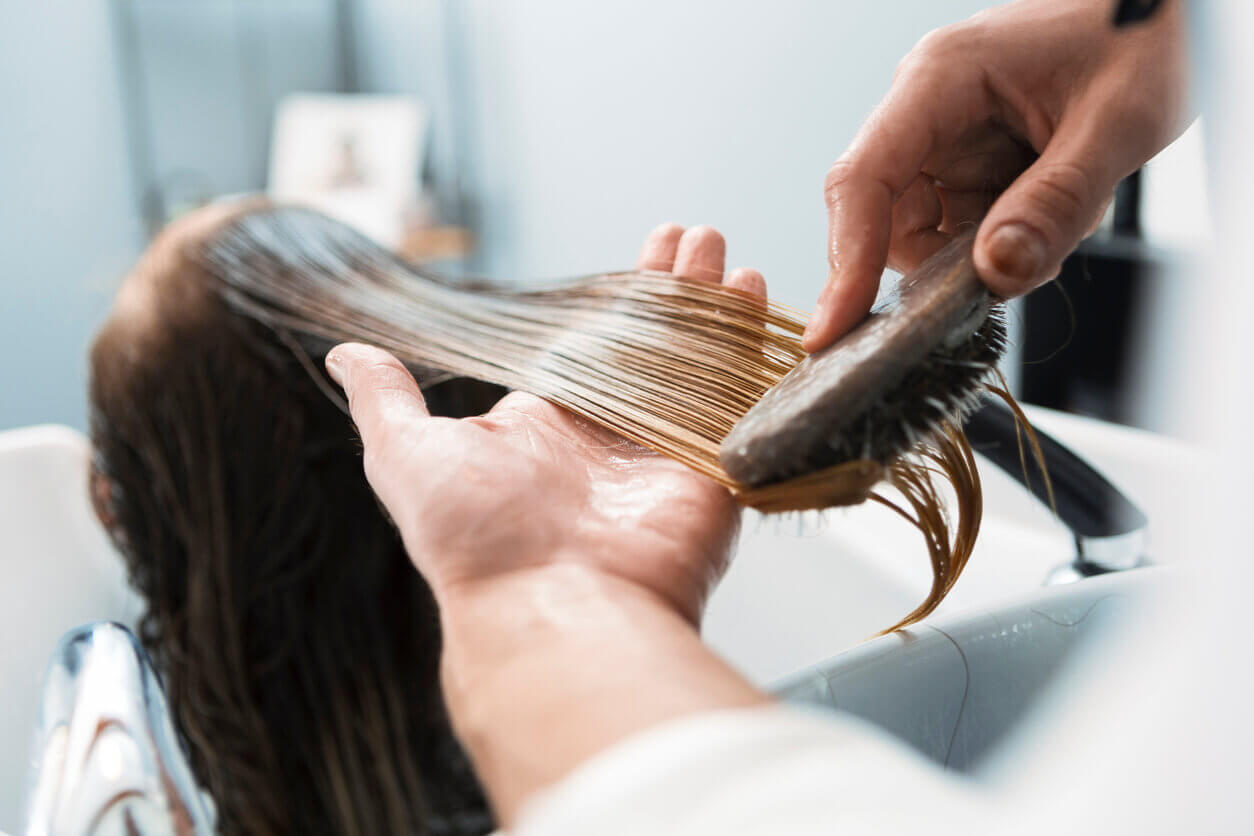Our bodies need a wide variety of vitamins, minerals and nutrients to function day-to-day, including zinc. While most people associate zinc with immune system function, it might surprise you to learn that this mineral is essential for producing hundreds of bodily enzymes and vital for many bodily functions.
Keep reading to understand why zinc is important for both you and your hair’s health, along with ten zinc-rich vegan foods and what supplement you can use to help you reach your hair wellness goals.
What Is Zinc and Why Is It Important?
Zinc is an essential trace mineral that is vital to good health. Since our bodies don’t produce or store zinc, we need to consume it every day from the foods we eat or the supplements we take.
“Zinc is the most important nutrient for your immune system, gut health, hair, skin and nails,” said Ellie Busby, a registered nutritionist with Vojo Health. In fact, zinc impacts our physiology in many ways.
This essential trace mineral is needed to produce over 300 different enzymes in the body, and it is essential for DNA and RNA synthesis. According to Dr. Alice Williams, a medical doctor who blogs about healthy living, zinc is important for a variety of basic physiological processes, such as:
- Taste and smell
- Immunity
- Growth and development
- Metabolism
- Reproduction and proper development of fetus
- Healthy skin, wound healing and reduction in the appearance of scars
“As an antioxidant, zinc is also important for healthy aging and supports the body's ability to repair everyday wear and tear on DNA caused by environmental factors such as harmful toxins, free radicals, poor diet, alcohol and stress,” said Jordan Dorn, a certified holistic nutritionist and co-founder of Zuma Nutrition.
So it’s clear zinc is vitally important to our everyday health, but how does zinc fit into the picture when it comes to our hair?
Shop: Supplements to Support Healthy Hair
How Does Zinc Impact Hair?
Given how important zinc is to such a wide umbrella of bodily functions, it probably comes as no surprise that it’s also important for healthy hair growth. Zinc is vital to the functioning of our hair follicles, where it impacts our hair growth cycles and helps with hair follicle recovery.
“Zinc helps to keep the scalp healthy and promotes hair growth,” said Dr. Williams. “It does this by stimulating the production of new cells and promoting the repair of damaged tissue. Additionally, zinc helps to protect the scalp from inflammation and infection.”
When the body doesn’t get enough zinc, it can impact your follicles and your hair.
“A zinc deficiency can impact hair growth in several ways,” explained Dr. Williams. "Since zinc’s important for the production of new cells in the hair follicle, a deficiency can impact the structural integrity of the hair shaft, making it more thin, brittle and prone to breakage. Additionally, zinc deficiency can lead to dry, flaky skin on the scalp, which can impede hair growth."
Not only that, but zinc deficiencies have also been linked to different hair loss conditions.
“Hair loss is among the most frustrating aspects of polycystic ovarian syndrome (PCOS),” said Angela Grassi, a registered dietician and founder of the PCOS Nutrition Center. In one study, 41.7 % of women with PCOS saw a significant reduction in hair loss after supplementing with zinc for eight weeks.
Zinc deficiencies have also been linked to alopecia areata, telogen effluvium and androgenetic alopecia.
“Hair loss is a common symptom of zinc deficiency, so making sure you get enough of it in your diet is critical for healthy hair,” said Dorn. So, how common are zinc deficiencies?
Find Out: Does Zinc Really Help with Hair Growth?
Are Zinc Deficiencies Common?
“A serious zinc deficiency is rare,” said Busby. “But many of us don't quite get enough to stay optimally healthy.”
Zinc deficiencies are more common in developing nations and in people who have health conditions like anorexia nervosa, alcohol use disorder and digestive disorders like Crohn’s, where not enough zinc is being consumed or the body has difficulty in absorbing it.
“It can also be seen in people who have diets high in non-fortified cereal products,” added Dr. Sapna Shah, a board-certified endocrinologist with Paloma Health.
“While your diet may not necessarily be low in zinc, its bioavailability — meaning the amount of a nutrient that's absorbed into the bloodstream and used for body functions — plays a big part in how much you're actually getting,” said Dr. Shah.
There are a variety of factors that may impede the absorption of zinc, but there is one, in particular, that might decrease zinc absorption.
“Phytic acid is known to inhibit zinc absorption,” explained Shah. And because phytic acid is found in many plant foods, “the bioavailability of zinc from plant foods may be slightly lower than that of animal foods,” she said.
More: 10 Vitamin Deficiencies That Can Cause Hair Loss
Are Vegans More Likely to Develop a Zinc Deficiency?
So if it’s harder to absorb zinc from plant sources, does that mean vegans might be especially prone to developing a deficiency?
Studies looking at the impacts of vegan and vegetarian diets have shown that these groups tend to have lower zinc levels. With that said, having a vegetarian or vegan diet does not mean you will develop a deficiency. “There is no definitive answer to this question as everyone's dietary needs differ,” explained Dr. Williams.
“It does not mean you cannot consume adequate amounts of zinc from plant foods; you just need to plan for it,” said Dr. Monisha Bhanote, a medical doctor and integrative lifestyle physician.
Shop: Ashley Thompson and Ashley Rosenberg's Vegamour Picks
How Much Zinc Do I Need?
Your daily zinc requirements will depend on your age and sex, among other factors.
“The average adult woman needs 8 milligrams of zinc every day, while the average adult male needs 11 mg,” said Dr. Bhanote.
With that said, if you’re a vegan or vegetarian, you’ll need to up those values to account for lower zinc bioavailability from plant sources. “If you’re vegan or plant-based, experts recommend you should aim to consume 50% more zinc than recommended,” said Busby.
This works out to 12 mg for adult women and 16.5 mg for adult men.
10 Vegan Zinc-Rich Foods
There are many foods high in zinc. Here are 10 of the best.
Legumes
Considered powerhouses in the healthy food arena, legumes are a great source of essential minerals like iron, copper, magnesium, potassium and, yes, zinc. Look to chickpeas, lentils and black-eyed peas as particularly rich sources.
Seeds
Seeds are another food group that contains lots of important vitamins and minerals. Pumpkin seeds are one of the most zinc-rich of all seeds, with bonus points for pumpkin seed oil showing promise in combating hair loss, too. Hemp, chia and flax seeds are also good sources of zinc.
Nuts
Nuts offer up healthy fats along with protein, fiber and vitamins. They’ve long been a staple in healthy diets and can help cover your zinc needs, too. Pine nuts, cashews, pecans and walnuts can all provide you with a good source of zinc.
Whole Grains
Whole grains are a good source of zinc: but not so with their processed counterparts. When the outer layer of whole grain (called the germ) is removed in processing, much of the nutritional value is lost. Look to whole wheat, quinoa, oats and rice for moderate levels of zinc.
Nutritional Yeast
Nutritional yeast is a flaky yeast product that has become a popular addition to many plant-based diets due to its savory, cheese-like flavor. Not only that, but this tasty seasoning can also be a good source of zinc!
Dark Chocolate
If you want an indulgent way to sneak some extra zinc into your diet, then look no further than dark chocolate. In addition to zinc, you’ll be getting antioxidants, iron, magnesium and copper.
Tofu
Tofu is another good plant-based source of zinc, offering up calcium, manganese and magnesium. Since protein is another vitally important nutrient for hair growth, as a rich plant-based protein source, tofu is a great option for vegan diets.
Mushrooms
Mushrooms are a decent source of zinc, with shiitake offering the highest levels amongst our fungi friends. You’ll also get fiber, protein, antioxidants and selenium.
Spinach
Spinach is another decent source of zinc, and it’s among the highest sources from leafy greens. It's also a great source of fiber while also containing vitamin A, vitamin C, vitamin K, iron, folate and potassium.
Avocado
Healthy fats: check. Vitamins: check. Minerals: check. In addition to being a decent source of zinc, who doesn’t want a little more avocado in their lives?
More Yum: The 12 Best Foods for Hair Growth
Daily Zinc Requirements Made Easy
“With a little planning, it's easy to get enough zinc,” said Sarah Skovran, a registered dietitian nutritionist and personal trainer in Maine.
Of course, life happens, and sometimes our diets aren’t quite what they should be. When you need a nutritional boost to your regular diet, consider a hair-friendly supplement like our GRO Biotin Gummies.
In addition to offering 25% of your daily recommended intake of zinc, our gummies have been carefully formulated with vitamins and minerals that are essential to scalp and hair health. Among other important ingredients like biotin, each gummy packs vitamins B-5, 6 and 12 to help support your body’s production of keratin and collagen, along with vitamins A, C and E work to neutralize follicle-damaging free radicals.
If you’re thinking about adding zinc supplements to your hair routine, talk to your doctor.
“It's okay to supplement with zinc every day at the recommended doses,” said Dr. Shah. “However, zinc toxicity is a true risk, so talk to your doctor about appropriate dosing versus increasing dietary intake. “
The Takeaway
Zinc is an essential mineral that’s essential to our general health and well-being, not to mention the regular functioning of our hair follicles. While zinc deficiencies aren’t very common, it can be challenging to get an adequate intake of zinc from plant sources. Seek out foods high in zinc like seeds, nuts, legumes, whole grains and other healthy foods to get adequate levels of zinc through your diet. If you think your zinc levels might be low or you want to start taking a zinc supplement, be sure to speak with your doctor first to avoid zinc toxicity.
#include-related-slider#
More From VEGAMOUR
- Shop: Everyday Supplements for Healthy Hair
- 12 Foods to Grow Your Healthiest Hair Ever
- These 8 Foods and Eating Habits May Contribute to Hair Loss




















